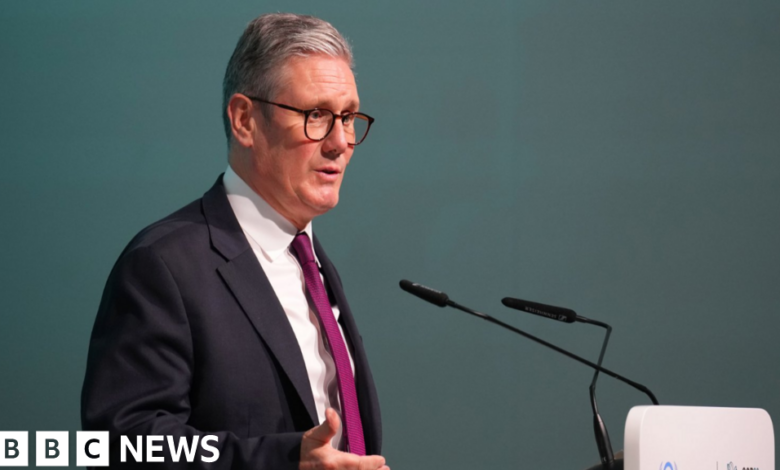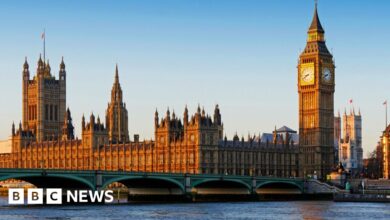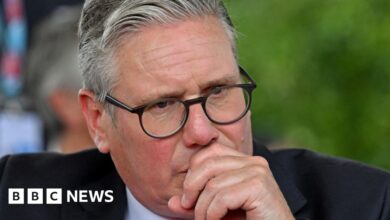Starmer announces UK target for 81% carbon emissions cut by 2035

Prime Minister Sir Keir Starmer has announced fresh climate change targets at a global summit, saying he wants the UK to lead on cutting emissions.
The UK will now aim for an 81% cut in its emissions by 2035, he told the UN conference of parties (COP29) in Azerbaijan.
The target updates a 78% pledge by 2035 under the previous Conservative government, although that also included international aviation and shipping emissions, and goes beyond another pledge of a 68% reduction by 2030.
Sir Keir insisted the government would not “tell people how to live their lives” but the target was vital to the UK’s future prosperity and energy security.
The prime minister said the new target was based on recommendations from the UK’s independent climate change committee (CCC) aimed at limiting global warming to 1.5C compared to levels in 1990.
He was one of only seven G20 leaders attending the summit, with 13 absentees including the premiers of the US, China, France and Germany.
Sir Keir would not be drawn on his views about president-elect Donald Trump, who has promised to cut climate rules during his election campaign.
He said: “Make no mistake, the race is on for the clean energy jobs of the future, the economy of tomorrow, and I don’t want to be in the middle of the pack – I want to get ahead of the game”.
The target will be included in papers to go before Parliament before February and, although Sir Keir did not announce any new policies, he did commit to continuing to provide £11.6bn of climate finance until March 2026, a pledge made under the previous government.
Announcing a £1bn investment in a wind turbine project in Hull, which he said would create 1,300 local jobs, Sir Keir said the world was standing at a “critical juncture in the climate crisis”.
The UK has called for other countries to match the new target, following stark warnings from the United Nations that the world is on course for a 3.1C rise without further cuts.
The latest target is broadly in line with the UK’s legally-binding carbon-cutting path towards net zero emissions by 2050, contained in the 2015 Paris Agreement.
That international agreement ties the UK to ratcheting up new “nationally determined contributions” (NDCs) for carbon reduction every five years, which has seen the a 68% cut by 2030 increase to an 81% cut by 2035.
The Climate Change Act 2008 also set legally-binding domestic agreements on carbon budgets in five year chunks until 2050, which unlike the NDC targets also include international aviation and shipping emissions.
The latest of these is the sixth carbon budget, which runs between 2033-2037, and has already been set at 78%.
Since taking power in July, Labour has ended an effective ban on new onshore wind projects and pledged not to issue any new oil and gas exploration licenses in the North Sea, as well as closing the UK’s last coal power plant in September.
The switch towards greener energy has already halved the UK’s annual greenhouse gas emissions since 1990 – but the CCC has previously said further reductions will be difficult without lifestyle changes.
The government advisers said taxes on meat and dairy might be needed if people do not voluntarily reduce their consumption of the products, and there should be moves to phase out the use of petrol cars.
Speaking at the summit, Sir Keir said the new UK target would be “difficult” but “achievable”, and he wanted government to “tread lightly on people’s lives”.
“It’s not about telling people how to live their lives – I’m not interested in that,” he added.
“I am interested in making sure their energy bills are stable, that we’ve got energy independence, and that we also along the way pick up the next generation of jobs.”
However, shadow energy secretary Claire Coutinho claimed the new target would lead to “hardship” for the British people.
During energy questions in the Commons, Coutinho said making “already stringent carbon emission targets even higher” would require a “shift away from meat and dairy” and “less travel”.
The Conservative MP claimed the approach would “see our reliance on Chinese imports – a country which is 60% powered by coal – go through the roof”.
In response, energy minister Kerry McCarthy said: “It’s really important that we are stepping up and showing global ambition.
“Reaching net zero in this country and getting to clean power by 2030 is a massive opportunity – it is not a cost.”
The interim chair of the CCC, Professor Piers Forster, welcomed the new target and said it was feasible based on the latest science, technological developments, and the UK’s national circumstances.
“Our analysis shows that this is a feasible target that will support jobs and investment,” he said, adding the UK was currently running behind schedule on delivering its 2030 target of 68% cuts.
He added: “A target is only as meaningful as the delivery against it.
“The UK needs to get back on track to deliver against our existing 2030 NDC commitment.
“We need to see further urgent action to speed up deployment of low-carbon solutions such as electric vehicles, heat pumps, and tree planting.”
All countries who have signed up to the Paris Agreement should submit their latest carbon reduction targets by a deadline of February next year and a copy of that memo, known as the Information to facilitate Clarity, Transparency and Understanding (ICTU), will be presented to MPs before then.




